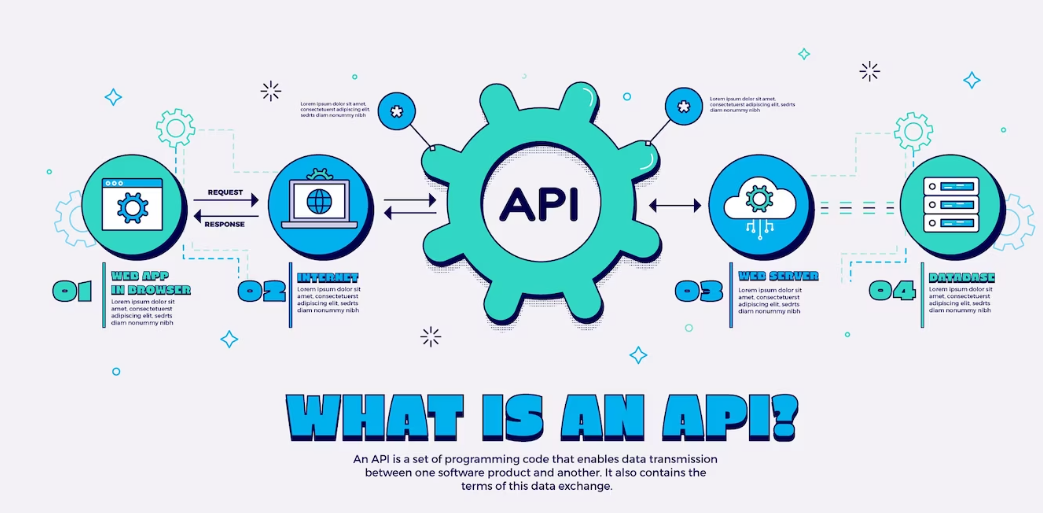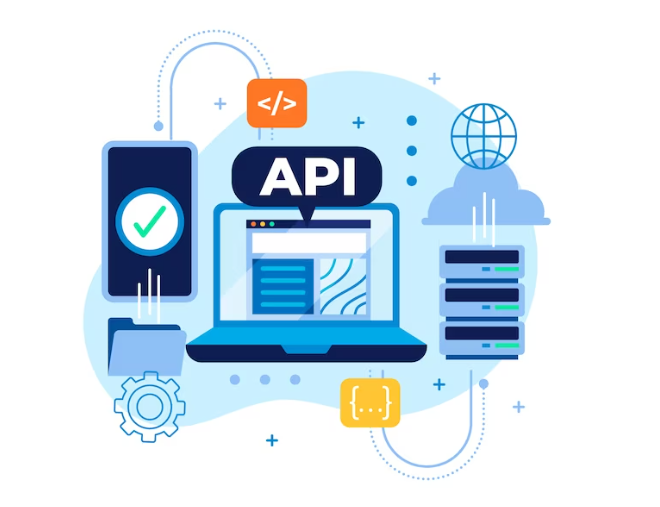API Development & Integration
API development and integration play a crucial role in modern software development, enabling seamless communication and data exchange between different applications and systems.
Introduction to API Development
In the ever-evolving digital landscape, APIs act as the glue that connects different software systems, enabling them to interact and share data seamlessly. API stands for Application Programming Interface, which defines the set of rules and protocols that allow applications to communicate with each other. API development involves creating and maintaining these interfaces to ensure smooth data exchange.

Understanding APIs and Their Functionality
APIs serve as intermediaries between different software systems, allowing them to send requests and receive responses. They define a standardised way for applications to interact, making it easier for developers to integrate services without worrying about the underlying implementation. APIs can handle various tasks, such as retrieving data, performing actions, or executing specific functions.
Benefits of API Development and Integration
API development and integration offer numerous benefits to businesses and developers alike. Firstly, APIs promote code reusability, enabling developers to leverage existing functionalities and services rather than reinventing the wheel. This saves time and effort while ensuring consistent performance across different applications.
Additionally, APIs facilitate interoperability, allowing businesses to connect their software systems with external services, third-party applications, or even partner platforms. This opens up a world of possibilities for collaboration and integration, empowering businesses to create comprehensive solutions by combining different services.
API Design and Development Best Practices
When developing APIs, adhering to best practices is crucial to ensure their effectiveness and usability. Here are some key considerations:
Clearly Define API Goals and Functionality: Start by identifying the purpose and scope of your API. Clearly define the goals it aims to achieve and the specific functionality it will provide to users.
Design Intuitive and Consistent APIs :Develop APIs that are intuitive and follow consistent design patterns. Use descriptive and concise naming conventions for endpoints, parameters, and response formats.
Prioritise Security and Authentication :Implement robust security measures to protect sensitive data and prevent unauthorised access. Use secure authentication mechanisms such as API keys, tokens, or OAuth protocols.
Implement Rate Limiting and Throttling:To prevent abuse and ensure fair usage, implement rate limiting and throttling mechanisms. This helps maintain system performance and prevents excessive API requests.
Implementing APIs in Different Programming Languages
APIs can be implemented in various programming languages based on the specific requirements and preferences of developers. Some commonly used languages for API development include:
Python: Known for its simplicity and versatility, Python is a popular choice for API development. It offers a wide range of frameworks and libraries, such as Flask and Django, to streamline the development process.
Node.js: Built on JavaScript, Node.js provides a lightweight and efficient environment for building APIs. It leverages an event-driven architecture, making it suitable for handling a large number of concurrent requests.
Ruby: With its elegant syntax and strong community support, Ruby is another language frequently used for API development. The Ruby on Rails framework simplifies the development process and promotes code readability.
Authentication and Security in API Integration
Authentication and security are paramount when integrating APIs into software systems. By implementing secure authentication mechanisms, businesses can ensure that only authorised users and applications can access their APIs. Common authentication methods include:
API Keys: Assigning unique API keys to authorised users, which they include in their requests for authentication.
OAuth: A widely adopted protocol for authorisation, OAuth allows users to grant access to their data without sharing their login credentials.
API Documentation and Versioning
API documentation plays a crucial role in helping developers understand how to interact with an API effectively. Well-documented APIs provide clear instructions, sample requests, and responses, making integration easier for developers. Additionally, versioning APIs allows businesses to introduce updates or changes without breaking existing integrations, ensuring backward compatibility.
Testing and Debugging APIs
Thorough testing and debugging are essential to identify and resolve issues in API development. Developers should conduct comprehensive unit tests, integration tests, and performance tests to ensure that APIs function as intended. Effective debugging practices, such as logging and error handling, help diagnose and fix issues quickly, improving the overall reliability of the API.
Challenges and Solutions in API Development
API development comes with its fair share of challenges. Some common hurdles include:
Scalability: As the usage of an API grows, it needs to handle an increasing number of requests efficiently. Employing scalable infrastructure and optimising code can address scalability challenges.
Versioning and Compatibility: As APIs evolve, maintaining backward compatibility becomes crucial. Versioning APIs and implementing backward-compatible changes help prevent disruptions for existing users.
Security Risks: APIs are susceptible to security vulnerabilities, such as unauthorised access or data breaches. Implementing robust security measures, including encryption and regular security audits, can mitigate these risks.
Future Trends in API Development
As technology advances, API development continues to evolve. Some future trends to watch out for include:
GraphQL: Offering a more efficient and flexible approach to data querying, GraphQL is gaining popularity as an alternative to traditional RESTful APIs.
Event-Driven Architectures: APIs built on event-driven architectures enable real-time communication and data streaming, facilitating seamless integration between systems.
AI-powered APIs: With the rise of artificial intelligence, APIs that provide machine learning capabilities and predictive analytics are becoming increasingly prevalent.
Services Offered in API Development and Integration
At Our company, we specialise in providing comprehensive API development and integration services. Our expert team of developers and engineers is proficient in creating robust and scalable APIs that facilitate seamless communication and data exchange between different applications and systems. With our expertise, we can help businesses streamline their software solutions and harness the power of APIs to drive innovation and growth. Read on to discover the range of services we offer in API development and integration.
API Strategy and Consulting
We understand that every business has unique requirements and goals. Our API strategy and consulting services help clients define their API roadmap, identify potential integration opportunities, and develop a comprehensive plan for API implementation. We work closely with our clients to understand their specific needs and align their API strategy with their business objectives.
API Design and Development
Our experienced team excels in designing and developing APIs that are scalable, secure, and efficient. We follow industry best practices and standards to ensure that the APIs we create are intuitive, well-documented, and easy to integrate. Whether you need RESTful APIs, SOAP APIs, or GraphQL APIs, we have the expertise to deliver high-quality solutions tailored to your unique requirements.
API Integration and Middleware Development
Integrating APIs into existing systems can be a complex task. Our API integration services enable businesses to seamlessly connect their applications with third-party services, cloud platforms, and other external systems. We leverage industry-leading middleware solutions to ensure smooth data flow and interoperability, allowing our clients to leverage the power of APIs without disruptions.
API Security and Authentication
Ensuring the security of your APIs and protecting sensitive data is of utmost importance. Our team implements robust security measures, including authentication mechanisms such as API keys, tokens, and OAuth protocols. We conduct thorough security audits and implement encryption techniques to safeguard your API infrastructure and prevent unauthorised access.
API Testing and Performance Optimisation
To ensure the reliability and performance of your APIs, we conduct comprehensive testing and optimisation. Our team performs unit tests, integration tests, and stress tests to identify and resolve any issues or bottlenecks. We also optimise API performance by implementing caching, rate limiting, and other techniques to enhance response times and scalability.
API Documentation and Support
Clear and comprehensive documentation is vital for developers to integrate and utilise your APIs effectively. We provide detailed API documentation that includes usage guidelines, sample requests and responses, and code snippets. Additionally, our team offers ongoing support and maintenance services to address any queries, troubleshoot issues, and ensure the smooth functioning of your APIs.

Frequently Asked Questions
Q 1: What is API development?
A:API development involves creating interfaces that enable different software applications to communicate and exchange data seamlessly. APIs define the rules and protocols for interaction, allowing systems to integrate and share information.
Q 2: Why is API integration important for businesses?
A:API integration allows businesses to connect their software systems with external services, third-party applications, and partner platforms. This integration enables data sharing, enhances functionality, and enables businesses to create comprehensive solutions by combining various services.
Q 3: How can APIs benefit my business?
A:APIs offer several benefits, including increased efficiency, scalability, and interoperability. By leveraging APIs, businesses can streamline processes, access external functionalities, and enhance their software solutions without having to build everything from scratch.
Q 4: How do you ensure the security of APIs?
A:We prioritise API security by implementing industry-standard authentication mechanisms, such as API keys, tokens, and OAuth protocols. We conduct regular security audits, use encryption techniques, and follow best practices to protect sensitive data and prevent unauthorised access.
Q 5: Do you provide support and maintenance for APIs?
A:Yes, we offer ongoing support and maintenance services for APIs. Our team is available to address any queries, troubleshoot issues, and ensure the smooth functioning of your APIs. We also provide updates and enhancements to keep your APIs up to date with changing requirements.
At Our company ,we are committed to delivering exceptional API development and integration services. Contact us today to learn how our expertise can help you unlock the full potential of APIs and drive your business forward

